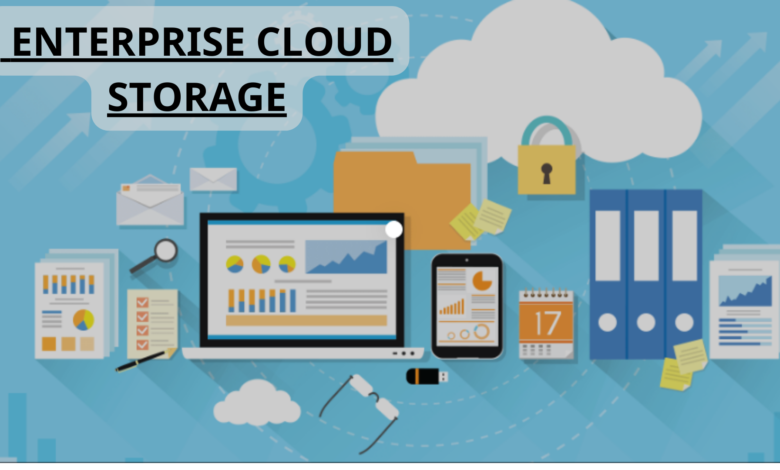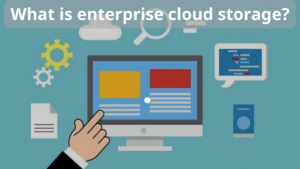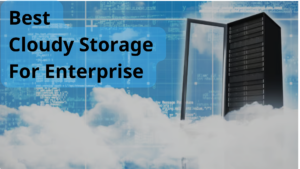Enterprise Cloud Storage Is Worth Using Or Not? Here is the Best Answer

Enterprise cloud storage’s broad use has the ability to profoundly alter how firms conduct their operations going forward. Businesses will depend more and more on cloud-based services as more firms shift their data and apps to the cloud, which will reduce the demand for on-premises IT infrastructure. At Wikifont.net, we will discuss what enterprise cloud storage is, how many types of cloud storage, how does cloud storage work and so on.
What is enterprise cloud storage?
Enterprise cloud storage refers to the use of cloud-based storage by companies to access, manage, and store their data. These solutions typically call for the use of distant servers that are hosted by a third-party provider and accessed via a secure network link online.
The use of cloud storage enables companies to forgo the need for costly on-premises storage hardware. They can simply scale their storage capacity up or down as necessary thanks to it. Additionally, compared to conventional storage methods, corporate cloud storage frequently provides improved data security, making it a popular option for many businesses.
4 types of cloud storage
Public, private, hybrid, and community cloud storage are the four primary types of cloud storage. Each of these varieties of cloud storage has distinctive features and advantages, and the best option for a given organization will rely on its particular needs and specifications. An summary of each of the four varieties of cloud storage is provided below:
- Public cloud storage: Utilizing remote servers owned and run by a third-party provider and made accessible to the general public is public cloud storage. The most affordable solution is usually public cloud storage because customers only pay for the storage and services they really use.
- Private cloud storage: Utilizing distant servers that are owned, managed, and accessible only to a single enterprise is known as private cloud storage. Although private cloud storage allows businesses more security and control over their data, it can also cost more than public cloud storage.
- Hybrid cloud storage: On-premises storage infrastructure and cloud-based storage services are combined in hybrid cloud storage. This gives businesses more flexibility and scalability while enabling them to benefit from the advantages of both private and public cloud storage.
- Community cloud storage: Utilizing distant servers shared by a number of businesses with comparable needs and specifications is known as community cloud storage. Organizations can benefit from both public and private cloud storage with community cloud storage, which also enables them to split the expense of the underlying infrastructure.
How does cloud storage work?
A third-party service provider offers cloud storage, which is a method of online data access. Data from the company is stored on a network of servers that the service provider manages and maintains. When an employee needs to access company data, they use a web-based interface or a dedicated client program to connect to the service provider’s servers over the internet.
To make sure that the company’s data is constantly available and accessible, the service provider often employs a method called data replication. This entails duplicating the data across several servers in the network of the service provider so that it can still be accessed from a different server in the event of a server failure.
Cloud storage providers use a number of security methods in addition to data replication to safeguard the organization’s data from unwanted access and data breaches. Access control protocols, encryption, and authentication are a few examples of these safeguards.
Businesses that use cloud storage are often only charged for the storage space they actually use because pay-as-you-go billing is the norm. Because of this, cloud storage is an affordable option for businesses that need to manage and store vast volumes of data.
Advantages and disadvantages of using enterprise cloud storage
There are several benefits to using enterprise cloud storage, including:
- Flexibility: As a company’s demands change, enterprise cloud storage may be readily scaled up or down. Due to the lack of additional fees, businesses are able to swiftly change their data storage capacity to meet their changing needs.
- Accessibility: Employees have everywhere access to company data thanks to enterprise cloud storage, which is reachable from any location with an internet connection. For businesses with a distributed workforce or for employees who need to access data while traveling, this can be especially helpful.
- Cost-effectiveness: Compared to on-premises storage options, enterprise cloud storage is often more affordable. This is so that businesses only pay for the storage space that they really use. Cloud storage is invoiced on a pay-as-you-go basis.
- Reliability: Third-party service providers who specialize in providing enterprise cloud storage have the knowledge and funding necessary to guarantee the dependability and uptime of their data storage solutions. As a result, businesses can be assured that their data is constantly accessible.
- Security: Compared to on-premises storage options, enterprise cloud storage is often more secure. This is due to the fact that cloud storage providers have specialized teams of security professionals that are in charge of guarding against unauthorized access, data breaches, and other security threats to the company’s data.
While using enterprise cloud storage has many benefits, there may also be some drawbacks to take into account. These consist of:
- Dependence on internet connectivity:Accessing data from enterprise cloud storage requires an internet connection. Employees won’t be able to access company data if internet service is interrupted until the problem is fixed, so to speak.
- Limited control: Businesses that use business cloud storage rely on the service provider to maintain and secure their data. Because of this, they might not have as much control over their data as they would if they used an on-site storage option.
- Potential security concerns:There is always a chance that data breaches or illegal access to the company’s data could happen, even while business cloud storage providers take precautions to safeguard the company’s data. Thus, before utilizing commercial cloud storage, businesses must thoroughly assess the security procedures in place.
- Compliance issues: The processing and storage of sensitive data is subject to tight laws in some sectors, including healthcare and finance. Companies in these industries may find it challenging to adhere to these requirements if they use business cloud storage.
- Data migration challenges: It can be difficult and time-consuming to move significant amounts of data from on-premises storage to the cloud. To guarantee that all data is correctly transferred and business activities are not hampered, companies must properly plan and carry out the data migration.
Best enterprise cloud storage providers
Egnyte Business: Egnyte Business is a sophisticated and full platform for secure cloud storage and sharing. This solution earns our Editors’ Choice award for its centralized file storage capabilities and unwavering dependability.
Microsoft OneDrive for Business: Due to the expansion of the file types it can access, Microsoft OneDrive for Business has become the clear solution for businesses that focus on Microsoft. Artificial intelligence speeds up and simplifies access to recently modified and important files, folders, and projects.
IDrive Team: IDrive Team is a dependable choice for small organizations looking for cloud backup. One of its many powerful features is end-to-end data encryption, which can manage both small offices and dispersed teams or distributed workers.
Citrix Content Collaboration: Citrix Content Collaboration is a well-established, business-focused cloud storage solution that has been expertly turned into a flourishing collaboration platform with a focus on security.
Dropbox Business: Dropbox Business has improved an excellent online file storage alternative for small to medium businesses. It emphasizes teamwork more and offers features like Smart Sync and Remote Wipe.
Conclusion
In summary, enterprise cloud storage is a well-liked and becoming more and more crucial technology for companies of all kinds. It enables businesses to use remote servers to store, manage, and retrieve their data and files.
Conclusion: So above is the Enterprise Cloud Storage Is Worth Using Or Not? Here is the Best Answer article. Hopefully with this article you can help you in life, always follow and read our good articles on the website: Wikifont.net






